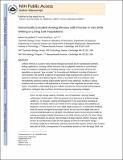Genomically encoded analog memory with precise in vivo DNA writing in living cell populations
Author(s)
Farzadfard, Fahim; Lu, Timothy K
DownloadLu_Genomically encoded.pdf (1.491Mb)
PUBLISHER_POLICY
Publisher Policy
Article is made available in accordance with the publisher's policy and may be subject to US copyright law. Please refer to the publisher's site for terms of use.
Terms of use
Metadata
Show full item recordAbstract
Cellular memory is crucial to many natural biological processes and sophisticated synthetic biology applications. Existing cellular memories rely on epigenetic switches or recombinases, which are limited in scalability and recording capacity. In this work, we use the DNA of living cell populations as genomic “tape recorders” for the analog and distributed recording of long-term event histories. We describe a platform for generating single-stranded DNA (ssDNA) in vivo in response to arbitrary transcriptional signals. When coexpressed with a recombinase, these intracellularly expressed ssDNAs target specific genomic DNA addresses, resulting in precise mutations that accumulate in cell populations as a function of the magnitude and duration of the inputs. This platform could enable long-term cellular recorders for environmental and biomedical applications, biological state machines, and enhanced genome engineering strategies.
Date issued
2014-11Department
Massachusetts Institute of Technology. Department of Biological Engineering; Massachusetts Institute of Technology. Department of Biology; Massachusetts Institute of Technology. Department of Electrical Engineering and Computer Science; Massachusetts Institute of Technology. Microbiology Graduate Program; Massachusetts Institute of Technology. Research Laboratory of Electronics; Massachusetts Institute of Technology. Synthetic Biology CenterJournal
Science
Publisher
American Association for the Advancement of Science (AAAS)
Citation
Farzadfard, F., and T. K. Lu. “Genomically Encoded Analog Memory with Precise in Vivo DNA Writing in Living Cell Populations.” Science 346, no. 6211 (November 13, 2014): 1256272–1256272.
Version: Author's final manuscript
ISSN
0036-8075
1095-9203